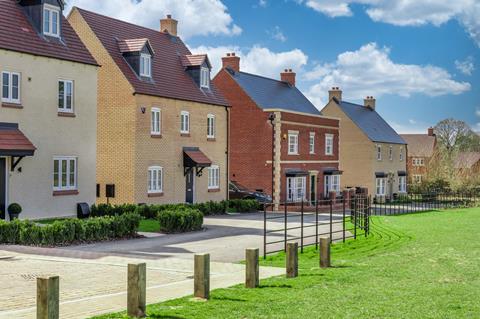Housebuilder takes margin hit as completions fall but predicts full year completions at top end of expectations
Housebuilder Persimmon has reported a collapse in pre-tax profit for the first half of its financial year as reduced sales and a weak market hit margins.
Announcing interim results to 30 June, Persimmon said pre-tax profit fell 65.7% to £151m, from £440m in the same period last year. The drop in profit came after revenue tumbled on lower completions, with turnover down 30% to £1.19bn on the sale of just 4,249 homes, down 36.2%.
However, shares in the listed housebuilder surged despite the figures after Persimmon said it had “broadly sustained” improved sales rates through the period and was confident of building 9,000 this year – at the top end of market expectations. The firm’s value rose as much as 5% in early trading, before partially falling back.
The drop in completions had been predicted by Persimmon management, given a low forward sales position for the firm at the start of the financial year. The firm said it had rebuilt its forward sales position in the last six months, with the current £1.6bn of forward sales secured 49% up on the figure recorded at the turn of the year, and inclusive of an 83% increase in private forward sales.

However, forward sales are still down 30% on where they were at the same point last year, given the collapse in the market at the end of 2022.
The firm said today it had secured sales per site per week of 0.59, a marked improvement from the levels seen at the end of last year in the wake of the mini Budget, with just 0.03 of that figure coming from bulk deals to private institutions and investors.
The drop in completions, combined with continued build cost inflation and low house price inflation, saw Persimmon’s profit margin plummet, with the firm recording a housing sales margin of 21.5%, compared to 31% at the same time last year. The underlying housing margin fell to 14% from 27% in 2022.
The firm said the reduction was down to “the net impact of house price inflation in the period against stubborn cost inflation, lower volumes and increased sales and marketing costs” plus “a higher proportion of homes sold to our housing associations partners”.
Persimmon has not announced a restructure or redundancy programme in the light of the lower volumes, unlike competitors and , and today said that it had a clear focus on protecting margins and believed its £281m cost base “compare[s] favourably within the sector”. However, the firm said that the imposition of a recruitment freeze had resulted in a drop in staff headcount of 300 over the last six months.
Persimmon said that in the five weeks since the period end, during which period other housebuilders have said high mortgage rates have been impacting on sales, its sales rate had fallen back to 0.41 homes per site per week, with no bulk sales. However, despite this drop-off, it said it had increased its forward sales position from £1.4bn to £1.6bn and that selling prices had “remained firm”. It added that it expected to build 9,000 homes by the year end, despite the fact “market volatility is likely to continue and affordability concerns remain”.
.
Persimmon’s interims come after Barratt, which has a June year-end, last month said it expected completions to drop by anything up to 23% in the year ahead.
The Construction Products Association has predicted that housing output will reduce by 20% this year, while the founder of housebuilder Weston Homes last month predicted that industry output will slump by around 40% in the year ahead, so bad was the current situation with both the market and planning.
Dean Finch, group chief executive, said: “Against a backdrop of higher mortgage rates, the removal of Help to Buy and significant market uncertainty, Persimmon has delivered a robust sales rate excluding bulk sales whilst growing the private average selling price in our forward order book and also securing cost savings.
“We are on track to deliver profit expectations for the year and are building a platform for future growth.
“Our private sales rate has remained broadly consistent throughout the period resulting in a private forward order book that is now 83% higher than it was at the beginning of the year.”



























No comments yet